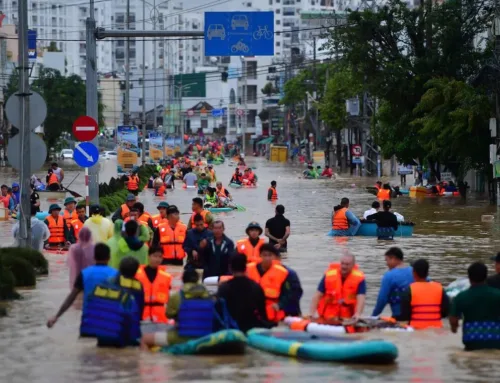Roadmaps, adaptations and transitions: what climate measures were agreed at Cop30?
November 22, 2025
The UN climate summit Cop30 moved forward the fight against the climate crisis and the damage it is already causing to lives and livelihoods. But the measures agreed are steps, rather than the leaps needed.
-
1. Multilateralism survived … just
The negotiations between more than 190 countries came close to collapse, as ambitious countries and petrostates threatened to block any deal or walk out. But global heating requires a global response and in today’s fractured geopolitical climate sealing a deal backed by all countries keeps the UN climate show on the road.
“At a time of great political challenge, 194 countries have come together within the Paris agreement to recommit to acting on the climate crisis,” said the UK energy secretary, Ed Miliband. “This agreement does not have all the ambition we would have wanted but it commits to keeping 1.5C alive.”
The US did not send a delegation – Donald Trump has dismissed the climate crisis as a “con job”. Some at Cop30 in Belém said the US stance had emboldened Saudi Arabia and other petrostates to fight even harder to block progress.
-
2. Adaptation funding tripled – but critics say it isn’t enough
The nations at Cop30 agreed to triple funding for adaptation – money provided by rich countries and desperately needed by vulnerable countries to protect their people from the accelerating impacts of the climate crisis. It is a significant advance but the goal of $120bn (£92bn) a year was pushed back five years from the initial suggested date of 2030.
Many countries and observers reacted angrily. “The outcome on adaptation is an insult to every community currently underwater or on fire,” said Harjeet Singh at the Satat Sampada Climate Foundation. “The refusal to commit to scaling up finance to the necessary $300bn annually for adaptation leaves the unprepared defenceless against inevitable ruin. The timeline ignores the urgency of the climate disasters striking us today.”
-
3. Plan for a just transition welcomed
A major outcome was the agreement of a just transition mechanism (JTM), a plan to ensure that the move to a green economy around the world takes place fairly and protects the rights of all people, including workers, women and Indigenous people.
Climate Action Network International, a huge coalition of campaign groups, welcomed the JTM as one of the strongest rights-based outcomes in the history of the UN climate negotiations.
“The adoption of JTM was a win shaped by years of pressure from civil society,” said Tasneem Essop, the executive director of the network. “This outcome didn’t fall from the sky: it was carved out through struggle, persistence and the moral clarity of those living on the frontlines of climate breakdown. Governments must now honour this JTM with real action. Anything less is a betrayal.” Efforts early in the talks to attach funding to the JTM failed.
-
4. No mention of fossil fuels in final text
Fossil fuels were not mentioned in the key final decision, despite a coalition of 90 developed and developing nations having pushed for a commitment to a roadmap to phase out fossil fuels to be included. Petrostates including Saudi Arabia and its allies fought fiercely to block this and succeeded.
The final text did add a reference to the “UAE consensus”, the overall package from Cop28 in Dubai in 2023 that contained the first pledge to move away from fossil fuels. However, the obliqueness of this reference is a retrograde step according to Dr Joanna Depledge, a Cop expert at the University of Cambridge: “The UAE consensus is [a] broad package including fully eight decisions adopted in Dubai on a whole range of issues.The Dubai fossil fuel transition language is therefore being deliberately diluted and obscured, not highlighted.”
-
5. Roadmap for transition away from fossil fuels survives – but it is voluntary
The roadmap for the transition away from fossil fuels was blocked from the formal Cop30 decision and the Brazilian presidency announced the plan would proceed outside the UN process. It will be merged with a plan backed by Colombia and about 90 other countries, with a summit set for April. This “coalition of the willing” could push progress forward.
The Cop30 president, André Corrêa do Lago, said the plan to develop the roadmap had the support of President Lula and would involve high-level dialogues over the next year, led by science and involving governments, industry and civil society. Once complete, he said they would report back to Cop.
“Those governments committed to tackling the climate crisis at its source are uniting to move forward outside the UN, under the leadership of Colombia and Pacific Island states, to phase out fossil fuels rapidly, equitably, and in line with 1.5C,” said Nikki Reisch, at the Center for International Environmental Law. “The international conference next April is the first stop on the path to a livable future.”
-
6. Rainforest conference fails to create deforestation roadmap …
Cop30 was deliberately sited in the Amazon to put focus on the vital role in climate of forests. Brazil’s environment minister, Marina Silva, tried to include a roadmap on ending deforestation in the core agreement at Belém.
But it was killed after being tied to the fossil fuels roadmap. The tying of the two appears to have been either an awful diplomatic blunder or sabotage by the Brazilian foreign ministry, which has long had a focus on selling the country’s oil abroad.
Toerris Jaeger, of Rainforest Foundation Norway, said: “The Amazon insisted on being heard. She forced her way into the climate negotiations with tropical heat, torrential rain, and the largest Indigenous delegation of any previous Cop.
“It is disappointing that countries did not agree to develop concrete plans to halt deforestation.”
-
7. … but new fund launched to help keep trees standing
Brazil did launch the Tropical Forest Forever Facility, again outside the UN process, but a multibillion-dollar investment fund that will pay nations to keep trees standing.
“The TFFF reflects a growing recognition that climate integrity and forest protection are inseparable,” said Dr Fernando Barrio, at Queen Mary University of London. “Whether it will be effective depends on its design. But the political signal is important because there is no path to 1.5C that does not involve ending deforestation this decade.”
Search
RECENT PRESS RELEASES
Related Post



